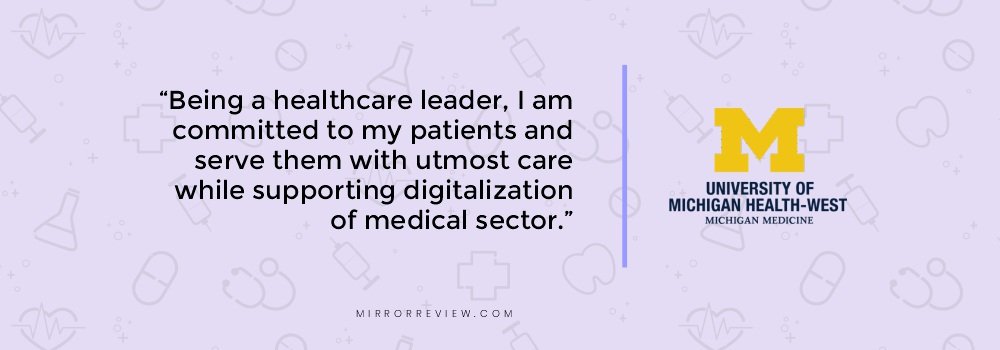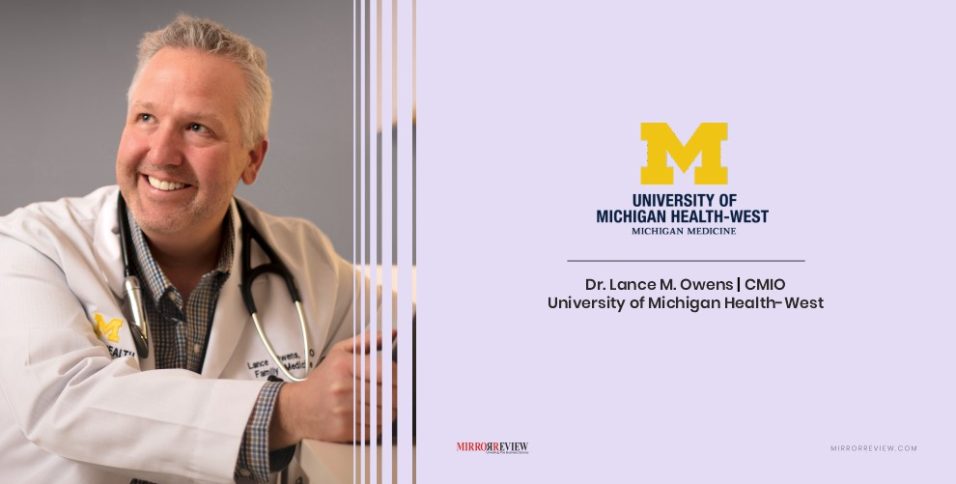As the healthcare sector undergoes dramatic transformation, successful medical leaders are those who can navigate change and leverage the advantages of technology – all while optimizing the highly personal relationships that patients have with their medical providers. Dr. Lance M. Owens (CMIO, University of Michigan Health-West) recognizes this.
Owens works at the forefront of digital innovation to bring patients and doctors closer together for better health outcomes, with greater coordination among care teams and enhanced professional satisfaction for providers. “At University of Michigan Health-West, we try to embody solutions that are patient-centric and provider-focused. … I think a modern-day healthcare leader needs to be a mix of a visionary, innovator, and manager who is nimble and adaptable while always keeping the best interest of the patient paramount to the organization,” Owens says.
Developing a Passion for Medicine
In high school, Owens considered a career in computer science, but his honors biology teacher noticed something he did not at first: passion and skills for medicine. With that seed of encouragement, Owens’ interest in healthcare grew throughout high school and with his enrollment at Michigan State University.
As an undergraduate, he majored in Physiology, deciding he could become a teacher if he did not get into the medical school. But that precaution proved unnecessary: Owens graduated from Michigan State University’s College of Osteopathic Medicine and later completed an internship focused on family medicine. He went on to serve in the U.S. Navy as a Health Professional Scholarship recipient. After his service, he completed his residency training in family medicine in Grand Rapids, Michigan, at the former Metro Health, now known as University of Michigan Health-West, and where he remains today.
Innovations that Change Lives
Since its founding in 1942 by a group of osteopathic doctors, University of Michigan Health-West has grown into an award-winning nonprofit multispecialty medical provider that is relentlessly advancing health to serve West Michigan as part of the state’s top-ranked health system.
The health system serves more than 250,000 patients annually at 30 locations across four counties, including a 208-bed teaching hospital in Wyoming, Michigan. More than 61,000 emergency patients are treated each year at the hospital, a Verified Level II Trauma Center, certified Comprehensive Stroke Center and accredited Chest Pain Center. The physician-led medical group, University of Michigan Health Partners, drives excellence and convenient access to primary and specialty care, including the expertise of University of Michigan Health, consistently ranked among the nation’s top academic medical centers.
A Physician Executive
As a practicing physician and a senior executive, Owens brings a clinical perspective to his leadership role. In addition to his fiduciary responsibility to the UMH-West board of directors and the organization, he works directly with the CEO and executive team to support the organization’s mission and vision through strategic innovation.
This includes helping to supervise the IT department, while also serving as a representative of his clinical colleagues as technology initiatives are developed and adopted. This dual perspective is essential, Owens said: “I have been told I am a ‘beginning to end’ CMIO, meaning that I look at the entire care continuum for all involved: patient, clinician, institution and community. The goal is to improve everyone’s experience to fulfill our mission, vision, and values.”
The Growing Role of Technology in Healthcare
One of the characteristics of University of Michigan Health-West is that it does not adopt technology for technology’s sake, Owens said. Instead, UMH-West leverages technology to find solutions that help improve patient care and quality.
For example, the COVID-19 pandemic accelerated the reliance on telehealth and video exams. UMH-West was a leader in adopting several tools to support this digital option for patients but insisted on maintaining the same caring approach that patients expect for in-person visits. “We are continuously striving to wrap our digital arms around our patients to preserve and promote the intimate relationship between our patients and the healthcare system, whether our patients are within our walls or remote,” Owens said.
Another example of this approach is UMH-West’s pioneering use of AI-supported documentation in the exam room. The organization’s primary care providers use Nuance’s Dragon Ambient Xperience (DAX) system to record conversations during visits and to transcribe the conversation into accurate clinical notes in the electronic medical record. This allows providers to focus on their patients instead of typing notes into a computer, and the reviews have been overwhelmingly positive, Owens said. Patients appreciate the meaningful interaction and undivided attention, while providers enjoy increased job satisfaction by being able to focus on practicing medicine without distraction.
Optimizing Balance in Work and Life
At a time when medical professionals are facing so many pressures that some are leaving the field, career satisfaction has never been more important. Owens says it is essential to identify stressful situations and to be honest with those who are facing them.
He recommends that every negative situation is conveyed promptly so that energy can be converted to constructive work. It is also helpful to highlight past successes and promote what got the team through other stressful situations, Owens says: “To reduce the stress of work we must optimize teamwork; listen to and support each other; cover each other’s blind spots or weaknesses and decompress together. We must recognize that working together to eradicate stress builds a stronger, more reliant and adaptable team.”
Owens identifies imbalances in work-life responsibilities as the main cause of stress, unprofessionalism, cynicism and presenteeism. Therefore, he finds balance in life by spending time with friends and family, skiing, hiking, kayaking and ice-climbing.
What the Future Holds
From his perspective as CMIO, Owens identifies three significant trends that will continue to drive change in the healthcare sector:
Managing data: Knowing and controlling data will become essential to improving quality, building more efficient processes, reducing the cost of care, knowing your patients and responding to their individual needs, and leveraging predictive modeling for better population management.
Artificial intelligence: The use of AI to capture and analyze visual and audio information will revolutionize how we care for our patients and how we document those interactions. The UMH-West use of DAX continues to reveal advantages. In addition to reducing a huge cognitive burden on clinicians and allowing more meaningful interactions with patients, this technology has the potential to assist in many other clerical tasks allowing our employees to spend more time with patients.
Managing the “care location” will be key: COVID-19 thrust us into the digital/telehealth space. Now we need to make sure we are using these tools appropriately. Balancing convenience with appropriate use will take some industry leadership, Owens said: “We need to remember that our patients are sick, hurting, and scared. When they reach out to us, they are not making dinner reservations, scheduling a haircut, or ordering food. They are asking for, and need, our help. They simply want to ‘see’ their doctor.”
Quotes

Also Read: The 10 Robust Healthcare Leaders of 2023





